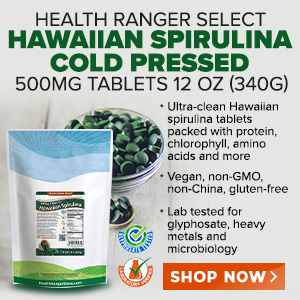
NSAIDs Pose Death Risk for Heart-Attack Patients (press release)
Friday, August 18, 2006 by: NewsTarget
Tags: health news, Natural News, nutrition
- Chemtrails unveiled: How the CIA and Big Business are manipulating the weather for profit
- Mysterious underwater pyramid off Japan could rewrite ancient history
- Israeli lobbyists boast of controlling US national security policy in leaked AIPAC audio
- Tulsi Gabbard leads charge against the Biden regime’s global censorship of the 'Disinformation Dozen'
- Geoengineers forced into secrecy as public backlash grows: How climate elites are manipulating populations to accept geoengineering experiments
- Fauci is back in the limelight, and he’s busy promoting a future COVID or FLU pandemic
- How to live without electricity: A practical guide for survival and preparedness
- Pfizer's RSV vaccine linked to preterm births as drug giant CONCEALED RISKS from pregnant women in unethical clinical trials
- Analysis: The coming economic collapse, a mass uprising and Trump's three secret weapons to halt the growing revolt
- Shedding light on the dark side of MMR vaccines: How vaccinated individuals SPREAD MEASLES & put the vulnerable at risk
- Common household chemicals linked to America's depression epidemic
- Aerosolized bioweapons? Strange “diploid biomasses” falling out of the sky in Florida captured under the microscope
- The HEART-HEALING power of SEVEN Mediterranean plants
- Over 30 pieces of evidence on how ‘the climate scam is collapsing’
- Widespread social and economic unrest: Steve Quayle issues urgent financial warning of imminent asset collapse in new interview with Mike Adams
- Tulsi Gabbard takes aim at censorship: Justice for the ‘Disinformation Dozen’
- Kiss Your Genetic Privacy Good-Bye! 23andMe Gets Green Light to Sell Your Intimate Genetic Details to Anyone They Want
- U.S. lawmakers investigate Meta over alleged China collaboration
- Aerosolized bioweapons? Strange “diploid biomasses” falling out of the sky in Florida captured under the microscope
- Widespread social and economic unrest: Steve Quayle issues urgent financial warning of imminent asset collapse in new interview with Mike Adams
- CLOT SHOT PLANDEMIC UNFOLDING: Fibrous, rubbery clots caused by covid injections have prion-like seeding activity
- Analysis: The coming economic collapse, a mass uprising and Trump's three secret weapons to halt the growing revolt
- Kiss Your Genetic Privacy Good-Bye! 23andMe Gets Green Light to Sell Your Intimate Genetic Details to Anyone They Want
- Tulsi Gabbard leads charge against the Biden regime’s global censorship of the 'Disinformation Dozen'
- Mike Adams releases country western hit single: Goin’ Back in Time is Comin’ Home
- DEATH by VACCINE or face PRISON time: Canadian Freedom Convoy leaders CONVICTED for protesting forced vaccination during the Covid Plandemic
- Fauci is back in the limelight, and he’s busy promoting a future COVID or FLU pandemic
- How Israeli military-connected corporations are secretly controlling your online privacy
- European Court of Justice: Healthcare professionals who promoted or administered COVID-19 vaccines are CRIMINALLY LIABLE for any harm caused
- Defunding DEADLY mRNA jabs: Government funding for mRNA technology being scrutinized and sidelined until proven "safe and effective" for real
- Tulsi Gabbard takes aim at censorship: Justice for the ‘Disinformation Dozen’
- Federal employees whine over DOGE's new directive requiring them to do a 5-point summary of weekly accomplishments
- U.S. approves new Russian ambassador as diplomatic thaw continues
- I Want My Bailout Money – new song and music video released by Mike Adams
- Trump administration poised to overhaul crypto regulations with new SEC leadership
- I Want My Bailout Money – new song released by Mike Adams
- Newly released JFK files reveal Pentagon's role in creating Lyme disease and covid in the same lab
- Mike Adams releases country western hit single: Goin’ Back in Time is Comin’ Home
- Analysis: The coming economic collapse, a mass uprising and Trump's three secret weapons to halt the growing revolt
- MEDICAL BOMBSHELL: FDA admits Covid mRNA 'Vaccines' CAUSE CANCER
- Dr. Mike Yeadon releases 15-minute testimony - WATCH - about genocidal intent of COVID “vaccines”
- Trump reverses course on Gaza plan, says “nobody is expelling Palestinians”
- 5 Simple steps to boost your brainpower: How to strengthen executive function in a distracted world
- The Health Ranger releases “Vaccine Zombie” song and music video, using AI-animated zombies for the music video
- California's social media censorship law struck down: A victory for free speech or a threat to online safety?
- Rep. Nancy Mace introduces bill to ban biological males from female facilities on federal property
- EPA advisor admits the agency is funneling billions to climate groups ahead of Trump’s return to White House
- Survival 101: Effective EMF blocking techniques
- Aerosolized bioweapons? Strange “diploid biomasses” falling out of the sky in Florida captured under the microscope
- OpenAI whistleblower who dissented against how the company trained ChatGPT found dead
- Trump Administration cuts 2,000 USAID jobs, places most employees on leave in sweeping reform effort
- A lack of integrity in Academia: Harvard professor found GUILTY of fraudulent research to promote CRT theory
- Sugarcane extract superior to cholesterol-lowering drugs?
- RFK Jr.'s SSRI antidepressant investigation sparks liberal meltdown, exposes Big Pharma's dangerous game
- Red Cross issues warning to stop blood plasma donations from vaccinated people
- Scientists confirm: GENIUS brain function can be spontaneously unleashed in humans without any apparent cause
- EPA advisor admits the agency is funneling billions to climate groups ahead of Trump’s return to White House
- HYSSOP: What research reveals about the health benefits of this ancient holy herb
- Two containers with completed ballots fall out of truck in Florida
- Fully vaccinated about to see “tsunami” of illness and death, warns virologist
- Global leaders unite to clamp down on “misinformation” with UN-backed Cascais Declaration
- Newly released JFK files reveal Pentagon's role in creating Lyme disease and covid in the same lab
- BREAKING: 2025 NDAA authorizes mandatory military draft of WOMEN across America… as Pentagon pursues global NUCLEAR war with both Russia and China at the same time
- Michael Yon warns of a ZIONIST TAKEOVER in Trump’s second administration
- Ozempic and Wegovy weight loss drugs are injectable LIZARD VENOM PEPTIDES that may unleash a devastating wave of organ failure… side effects align with symptoms of SNAKE BITES
- The Health Ranger releases “Vaccine Zombie” song and music video, using AI-animated zombies for the music video
- BOMBSHELL: DNA testing kits are a SCAM to develop ethnic-specific bioweapons
- Israeli soldiers accused of even more torture and abuse in the West Bank
- These 13 countries just signed an agreement to engineer a global FAMINE by destroying food supply
- Mike Adams releases country western hit single: Goin’ Back in Time is Comin’ Home
- NASA admits that climate change occurs because of changes in Earth’s solar orbit, and NOT because of SUVs and fossil fuels
- RFK Jr. clears key hurdle: Sen. Susan Collins backs controversial HHS nominee, signaling a new era for health policy
The research detailing these findings appears in the June 20 issue of the journal Circulation, and was first presented at the 2005 meeting of the American Heart Association. The results of the two studies are almost the same, although the latest study shows an even higher correlation between NSAID use and a second heart attack.
"The evidence is accumulating, and it seems that patients who have already had a heart attack are at even more risk than we thought before, and we are talking about short-term treatment," said study lead author Dr. Gunnar H. Gislason, senior resident at Gentofte University Hospital in Copenhagen, Denmark.
Dr. Mark Fendrick, professor of internal medicine at the University of Michigan School of Medicine and professor of health management and policy at the university's School of Public Health, added, "This is yet another study adding to the mountain of evidence suggesting that we should be very careful about the use of cox-2 drugs, specifically, and possibly all additional NSAIDs for patients at risk for cardiovascular adverse events."
NSAIDs are pain relievers, including aspirin, ibuprofen and naproxen, that carry a risk of gastrointestinal bleeding. Cox-2 inhibitors are a specific type of NSAID that do not carry that risk.
Cox-2 inhibitors and NSAIDs have been caught in a prolonged furor since September 2004, when the cox-2 Vioxx was withdrawn from the market due to concerns about cardiovascular safety. Similar concerns were raised about Bextra, another cox-2, then Celebrex, and then naproxen, a traditional NSAID. Bextra was later withdrawn from the market.
A number of studies continue to look at the different risks and benefits of the drugs. This new research is the first to look at patients who took NSAIDs after suffering their first heart attack.
The study authors looked at all patients in Denmark who had survived a first heart attack between 1995 and 2002. Then they cross-referenced this information with all prescription claims for NSAIDs after their hospital discharge. A total of 58,432 patients were included in the study.
Patients who had survived a first heart attack and were taking any NSAID were more likely to die than those who had survived one heart attack and were not taking NSAIDs. Death rates were highest among those taking cox-2 drugs and high doses of traditional NSAIDs.
Compared to patients not taking any of these drugs, the risk of death was two to three times higher for patients taking low-dose (25 milligrams or less a day) of Vioxx (rofecoxib) or 200 milligrams or less a day of Celebrex (celecoxib).
The risk of death was five times higher for patients taking high-dose Vioxx (more than 25 milligrams a day); almost five times as high among those taking more than 200 milligrams of Celebrex; more than four times higher for those on high-dose diclofenac (more than 100 milligrams daily); and more than two times greater for those taking high-dose ibuprofen (more than 1,200 milligrams daily).
Taking NSAIDs for only short periods of time was enough to show a detrimental effect, the study found.
Although aspirin was not evaluated in the study, the authors presumed that more than 90 percent of people being analyzed were probably taking this drug. Aspirin has a proven beneficial effect in preventing heart attacks.
More and more studies, most of them observational, are showing that NSAIDs have this deleterious effect. A large, randomized, controlled trial has yet to be completed, however, although one sponsored by Pfizer and conducted by the Cleveland Clinic will soon be under way.
So what should consumers do?
"Physicians and patients at risk should think thrice, not twice, before using NSAIDs," Fendrick said. "If someone with a cardiovascular risk absolutely needs NSAIDs, given the available evidence, I would suggest taking naproxen with a proton pump inhibitor" to counteract the gastrointestinal effects.
Gislason added: "Our recommendation is that patients should at least consult their physician if they are taking any of those drugs, and our recommendation would be that if they can't be without them, they should stick with low doses of the traditional NSAIDs and probably avoid the new cox-2 inhibitors."
Health news at FETCH.news
Get independent news alerts on natural cures, food lab tests, cannabis medicine, science, robotics, drones, privacy and more.
Take Action: Support Natural News by linking to this article from your website
Permalink to this article:
Embed article link: (copy HTML code below):
Reprinting this article:
Non-commercial use OK, cite NaturalNews.com with clickable link.
Follow Natural News on Facebook, Twitter, Google Plus, and Pinterest
Science News & Studies
Medicine News and Information
Food News & Studies
Health News & Studies
Herbs News & Information
Pollution News & Studies
Cancer News & Studies
Climate News & Studies
Survival News & Information
Gear News & Information
News covering technology, stocks, hackers, and more



"Big Tech and mainstream media are constantly trying to silence the independent voices that dare to bring you the truth about toxic food ingredients, dangerous medications and the failed, fraudulent science of the profit-driven medical establishment.
Email is one of the best ways to make sure you stay informed, without the censorship of the tech giants (Google, Apple, Facebook, Twitter, YouTube, etc.). Stay informed and you'll even likely learn information that may help save your own life."
–The Health Ranger, Mike Adams













































